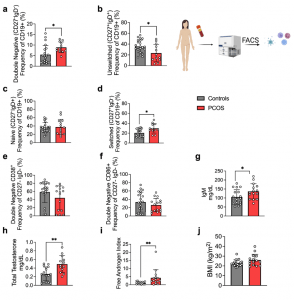Polycystic ovary syndrome (PCOS) is a common hormone disorder that affects a significant number of women. PCOS is characterized by irregular ovulation and menstruation, pregnancy complications, and insulin resistance, with the condition often exacerbated by being overweight. Recent studies have highlighted the association between hormonal changes in PCOS and variations in immune system B cells.
In a recent research paper, scientists investigated the impact of B cells on the development of PCOS, aiming to uncover potential new treatment approaches (Figure 1). Blood samples were collected from women with PCOS, revealing abnormal variations in the frequency of different B cell populations compared to healthy women. Notably, the study identified the presence of double negative B cells, a heterogeneous group that includes subtypes associated with potential autoimmune functions.

Figure 1: B cell frequencies and immunoglobulin M variations in women with Polycystic Ovary Syndrome. a. Total CD19+ Double Negative B cells (CD27- IgD-) b. Total Unswitched B cells (CD27+ IgD+) c. Total Naive B cells (CD27- IgD+) d. Total Switched B cells (CD27+IgD-) a-d Total CD19+ populations (controls n=22; PCOS n=15); e-f Expression on Double Negative B cells respectively of the surface markers CD38 and CD86 g. Circulating IgM titers h. Total testosterone i. Free Androgen Index (FAI) j. Body Mass Index. g-j (Controls n=18; PCOS n=15). All bars indicate means, error bars SD, circles represent human individuals. In the case of missing values due to lack of measurement, individuals were excluded from the analysis report for that variable. Unpaired Student’s t-test for analysis of naive, unswitched and DN CD86+ B cells, total testosterone, and BMI. Mann–Whitney test for all other B cell frequencies, antibody titers and FAI. *P<0.05, **P<0.01, ***P<0.001.
To further understand the role of B cells, the researchers conducted experiments on mice. They exposed mice lacking B cells to androgens, a group of hormones implicated in PCOS. PCOS-like mice exposed to androgens displayed altered frequencies of B cells, mirroring the findings in women with PCOS. However, concurrent treatment with a drug that blocks androgen receptors prevented these B cell alterations in both blood and tissues, including the ovaries and endometrium.
In conclusion, while androgens are necessary for the development of PCOS, the role of B cells in the syndrome remains unclear. The study highlights that B cells are affected in PCOS, potentially contributing to an increased susceptibility to certain comorbidities. However, the findings suggest that B cells do not cause PCOS itself. Further research is needed to fully elucidate the precise role of B cells in PCOS and to explore their potential as therapeutic targets for managing the condition and associated complications.
Journal article: Ascani, A, et al., 2023. The role of B cells in immune cell activation in polycystic ovary syndrome. eLife.










